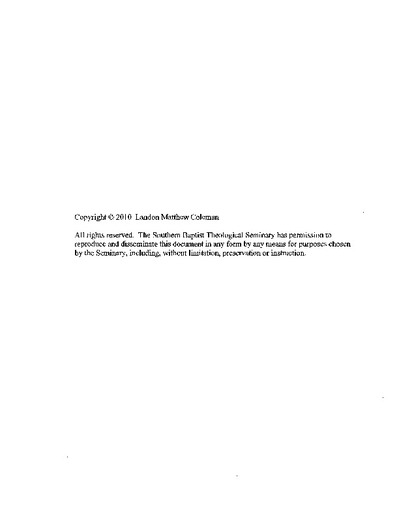Principalities and Powers: A Historical and Biblical Study with Strategic Application in North American Churches
Subject
DemonologyAbstract
This dissertation provides a historical and biblical study of the principalities
and powers. It also offers strategic application for North American churches. Chapter 1
introduces the issue of the principalities and powers. Three major contemporary
approaches to the principalities and powers are presented, and the impact of worldview is
discussed.
Chapter 2 offers a historical perspective on the principalities and powers. The
following four historical periods are considered: the early church (A.D. 100-500), the
medieval period (A.D. 500-1500), the Reformation (A.D. 1500-1800), and the nineteenth
and twentieth century (A.D. 1800-Present). For each period considered, attention is
given to the predominant interpretation of the principalities and powers as well as the
predominant proposed response to the principalities and powers.
Chapter 3 presents an analysis of the three major contemporary approaches to
the principalities and powers. The primary spokesmen for these approaches are Walter
Wink, C. Peter Wagner, and Clinton Arnold. Each of the three contemporary approaches
is analyzed in the areas of world view assumptions, interpretation of the principalities and
powers, proposed response of the church, and historical justification.
Chapter 4 offers a biblical perspective on the principalities and powers. First,
the relevant passages are interpreted and discussed. Second, the principalities and powers
are discussed systematically by considering the biblical teaching about their creation,
their fall, their initial defeat, their struggle, and their final defeat.
Chapter 5 argues that standing against the principalities and powers is a
corporate response. First, the relationship between the kingdom of God and the church is
explained. Second, the importance of world view is again discussed. Finally, a specific
strategy is offered for the church's stand against the principalities and powers. A short
concluding chapter summarizes the work and offers suggestions for further study.

